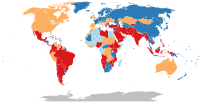
Photo from wikipedia
Even as the pandemic rages on across the globe, the notion of shutting down higher education has never been an option; instead, finding ways to circumvent it has led to… Click to show full abstract
Even as the pandemic rages on across the globe, the notion of shutting down higher education has never been an option; instead, finding ways to circumvent it has led to a greater reliance on online technology delivery of courses and programs. Although this is not meant as a complete substitute, critics argue that online education has widened the ‘diploma disease’ crisis. They argued that this would lead to serious long-term problems which may become irreversible. This comparative study was conducted using an ‘empirical survey’ with 120 students from each group (before and during COVID-19, giving a total of 240 samples/students) to conduct an in-depth study of the academic and job-ready performance of graduates. Findings show that pre-pandemic students did poorly academically compared to during-pandemic counterparts. On the other hand, pre-pandemic graduates achieved better job-readiness scores which included both aptitude and practicum. Moreover, both groups achieved well in terms of academic performance compared to their job-readiness scores. This leads to the question: is it the role of HE to value the concept of sustainable production or to produce certificates/qualifications? Apparently, the HE system has used COVID-19 as an excuse to extend the “diploma disease crisis”, a situation that must be addressed by devising a proper policy framework.
Journal Title: Technological Forecasting and Social Change
Year Published: 2021
Link to full text (if available)
Share on Social Media: Sign Up to like & get
recommendations!